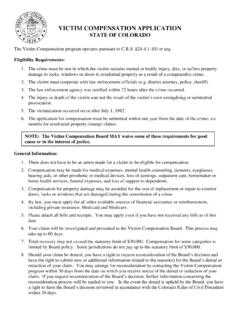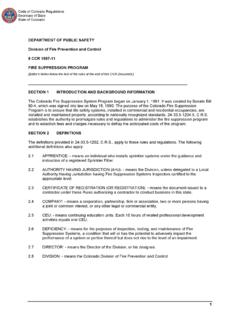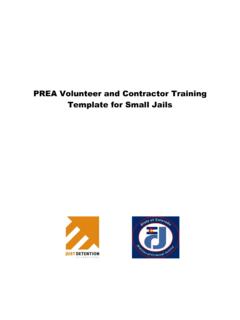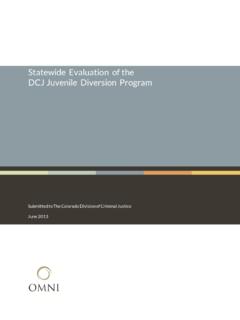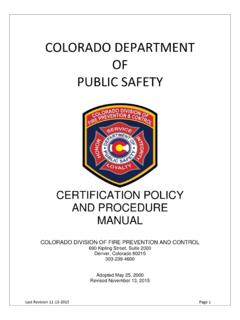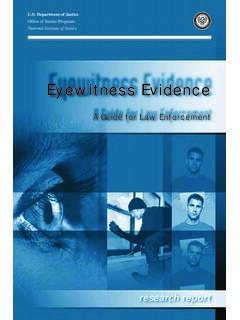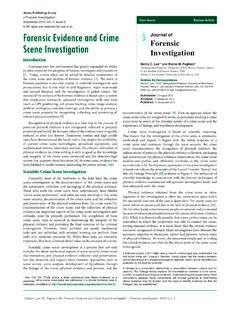Transcription of Colorado Crime Victim Rights - cdpsdocs.state.co.us
1 Colorado Crime Victim Rights Revised 2/16 (2015-VA-GX-0040) Introduction We are sorry to learn you have been a Victim of a Crime . As a Crime Victim , you may have experienced injury, loss, confusion, and a disruption of your life. Feelings of shock, disbelief, fear, vulnerability, anger, and frustration may occur. Having information and an understanding about the criminal justice system may be helpful to you at this time. Once a Crime is reported to a law enforcement agency, the criminal justice system process begins. It can be a confusing and sometimes frustrating experience for a person who is a Victim of a Crime . There are Victim / witness advocates throughout Colorado to provide support and assistance to victims of Crime during this process. This booklet has been prepared to assist you in understanding your Rights and to answer commonly asked questions.
2 Crime victims are such an important part of the criminal justice system process that Colorado voters amended the state Constitution to include Victim Rights in 1992. The Victim Rights Amendment states: Any person who is a Victim of a criminal act or such person s designee, legal guardian, or surviving immediate family members if such person is deceased, shall have the right to be heard when relevant, informed and present at all critical stages of the criminal justice process. All terminology, including the term critical stages shall be defined by the general assembly (Article II, Section l6A Colorado State Constitution). INTRODUCTION Crimes Covered by the Victim Rights Act The Constitution of the State of Colorado and the laws of the state [Section (1) ] guarantee certain Rights to victims of the following criminal acts: Murder; Manslaughter; Criminally negligent homicide and vehicular homicide; Assault; Menacing; Kidnapping; Sexual assault; Incest and aggravated incest; Child abuse; Sexual exploitation of children; Crimes involving child prostitution; Crimes against at-risk adults and at-risk juveniles; Indecent exposure; Violation of a criminal protection order issued against a person charged with sexual assault; Robbery aggravated, aggravated of a controlled substance; Crimes for which the underlying foundation has been determined to be domestic violence; Careless driving that results in the death of another person.
3 Failure to stop at the scene of an accident that results in the death of another person; Stalking; Human trafficking; First degree burglary; Invasion of privacy for sexual gratification; A Bias motivated Crime ; Retaliation against a Victim or witness ; Tampering with a Victim or witness ; Intimidation and aggravated intimidation of a Victim or witness ; Retaliation against a judge, prosecutor, or juror; Any criminal attempt, conspiracy, criminal solicitation, or accessory involving any of the crimes specified above. If a Victim is deceased or incapacitated, these Rights may be exercised by the Victim s spouse, parent, child, sibling, grandparent, grandchild, significant other, or other lawful representative. CRIMES COVERED BY THE Victim Rights ACT Critical Stages A Victim 's Rights are related to certain critical stages in the criminal justice process.
4 These stages include: Filing of charges and the decision not to file charges; Preliminary hearing; Any bond reduction or modification hearing;* Arraignment hearing; Motions hearing; Any subpoena for a Victim s mental health, medical, education or Victim compensation records;* Disposition of the complaint or charges against the person accused;* Trial; Sentencing hearing;* Appellate review or appellate decision; Post-conviction DNA testing and court proceedings initiated based on the result; Sentence reconsideration;* Probation revocation hearing; The filing of a complaint, summons, or warrant by probation for failure to report or because the location of a person convicted of a Crime is unknown; The change of venue or transfer of probation supervision; Request for release from probation supervision prior to the expiration of the defendant s sentence; Request for release from community corrections prior to the expiration of the defendant s sentence; An attack on judgment or conviction for which a court hearing is set; Parole application hearing; Parole, release, or discharge from imprisonment of a person convicted of a Crime ; Parole revocation hearing; Transfer to or placement of a person convicted of a Crime in a non-secure facility; Transfer, release, or escape of a person charged with or convicted of a Crime from any state hospital; Any petition by a sex offender to terminate sex offender registration; Any hearing concerning a petition for expungement of a juvenile offender s records;* and The execution of an offender in a capital case.
5 * In addition to the right to be informed and present, the Victim also has a right to be heard at the following hearings: 1) bond reduction or modification; 2) a subpoena for the Victim s records; 3) the court accepts a negotiated plea agreement or a plea of nolo contendere; 4) sentencing; 5) modification of the sentence; 6) the defendant requests a modification of the no contact provision of the criminal protection order; and 7) a petition for expungement of juvenile records. victims who are unavailable to attend a hearing where they have the right to be heard may request that the court provide them an opportunity to be heard through telephone or other similar technology by making a request to the district attorney s office. When any person attempting defense-initiated Victim outreach contacts any Victim of any Crime , the person shall immediately provide full and unambiguous disclosure of the person s legal name and the fact that the person is acting as an agent for the person accused of the Crime or for the defense team of such person.
6 CRITICAL STAGES The Victim Rights Act The enabling legislation known as the Victim Rights Act became effective in January of 1993, and was amended in 1995, 1997, 2000, 2006, and 2007, 2008, 2009, 2010, 2011, 2012, 2014 and 2015. In an attempt to balance the scales of justice, the Victim Rights Act provides victims of Crime an active role in the criminal justice process. The following is a summary of the Rights guaranteed by the Victim Rights Act (For a complete listing of your Rights , please refer to Colorado Revised Statutes through at ): To be treated with fairness, respect and dignity; To be informed of all critical stages of the criminal justice process ( victims of Crime must request notification, in writing, for post-sentencing critical stages); To be present at specified critical stages in the criminal justice process; To be free from intimidation, harassment, or abuse; To be informed about what steps can be taken including information about protection services, if there is any intimidation or harassment by a person accused or convicted of a Crime or anyone acting on that person s behalf.
7 To be present and heard regarding bond reduction or modification, a subpoena for the Victim s records, acceptance of a plea agreement, sentencing or modification of a sentence; To be heard by phone or similar technology when a Victim cannot appear in court; To be informed of the existence of the criminal protection order and upon request of the Victim , the procedure for modifying the protection order if a procedure exists; To receive a free copy of the initial incident report from the investigating law enforcement agency; except that the release of a document associated with the investigation is at the discretion of the law enforcement agency based on the status of the case or security and safety concerns in a correctional facility, local jail, or private contract prison; To have the Victim s social security number redacted or excluded from criminal justice documents when records are released to someone other than the Victim , a criminal justice agency, or the defendant s attorney of record; To be informed of the process the district attorney can use to request protection of the Victim s address (the court may or may not grant the request); To consult with the district attorney prior to any disposition of the case or before the case goes to trial and to be informed of the final disposition of the case; To be informed of the status of the case and any scheduling changes or cancellations, if known in advance; To receive and prepare a Victim impact statement and to be present and/or heard at the sentencing hearing; To have the court determine restitution and to be informed of the right to pursue a civil judgment against the person convicted of the Crime .
8 To prevent any party at any court proceeding from compelling testimony regarding a Victim s address, telephone number, place of employment or other locating information; To receive a prompt return of property when it is no longer needed as evidence; To be informed about the possibility of restorative justice practices; To be informed of the availability of financial assistance and community services; To be provided with appropriate employer intercession services regarding court appearances and meetings with criminal justice officials; To be assured that in any criminal proceeding the court, the prosecutor, and other law enforcement officials will take appropriate action to achieve a swift and fair resolution of the proceedings; Whenever practicable, to have a safe, secure waiting area during court proceedings; To be notified of the referral of an offender to community corrections and to provide a written Victim impact statement to the community corrections board and, if permitted by the board, to provide an oral Victim impact statement.
9 In addition, a Victim has a right to provide a separate oral statement to the community corrections board if the board is considering a transitional referral from the department of corrections; Upon written request, to be informed when a person accused or convicted of a Crime is released from custody other than the county jail, is paroled, escapes or absconds from probation or parole; The right to be informed of the filing of a petition to cease sex offender registration; Upon request, to be informed when a person who is accused or convicted of a Crime is released, discharged, or permanently transferred from the custody of the county jail; Upon written request, to be informed of and heard at any proceeding at which any postconviction release from confinement in a secure state correctional facility is being considered; Upon written request, to be informed when a person convicted of a Crime against the Victim is placed in or transferred to a less secure correctional facility, program, or placed on non-residential status, or is permanently or conditionally transferred or released from any state hospital; The right, at the discretion of the district attorney, to view all or a portion of the presentence report of the probation department; To be notified of a hearing concerning a petition for sealing of records; To be informed of the results of any court-ordered HIV testing; To be informed of any Rights which the Victim has pursuant to the Constitution of the United States or the State of Colorado ; and To be informed of the process for enforcing compliance with the Victim Rights Act.
10 Additional Rights and services are provided to child victims of Crime . Law enforcement officials, prosecutors and judges are encouraged to designate one or more individuals to try to ensure that the child and his/her family understand the legal proceedings and have support and assistance to deal with the emotional impact of the Crime and the subsequent criminal proceedings. THE Victim Rights ACT Agency Responsibilities Criminal justice agencies have certain responsibilities for assuring that victims receive their Rights . These responsibilities are as follows: LAW ENFORCEMENT S RESPONSIBILITIES Law enforcement agencies have the responsibility to provide victims of Crime with written information about: The Rights enumerated in the Victim Rights Act; The availability of financial resources such as Victim compensation benefits and how to apply for those benefits; The availability of protective court orders in order to obtain protection from the person accused of committing the Crime ; and The availability of a free copy of the initial incident report.
